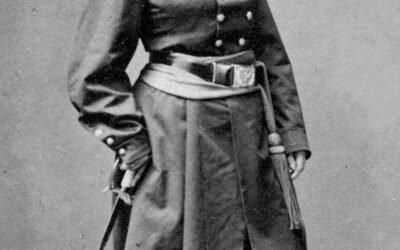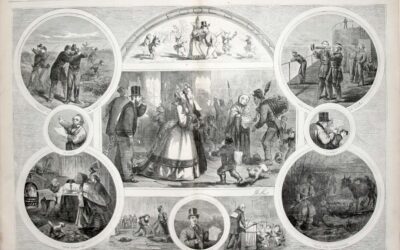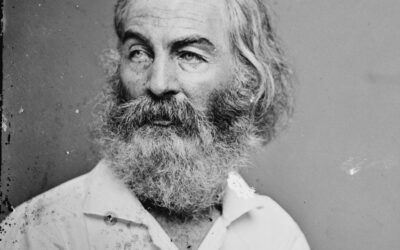Special thanks to Dennis Lawrence of the Gettysburg Discussion Group for pointing out the following from Speaking about Lincoln and The Lincoln Log for April 14
————————————————————————————————-
Friday, April 14, 1865.
Capt. Robert Lincoln arrives in Washington from scene of Gen. R. E. Lee’s surrender at Appomattox, Va., in time for 8 A.M. breakfast with President. Helm, Mary, 259; Francis F. Browne, The Everyday Life of Abraham Lincoln (New York: Thompson, 1886), 701-2.
During morning Lincoln confers at length with Cong. Colfax (Ind.), who is preparing to visit West Coast. Willard H. Smith, Schuyler Colfax: The Changing Fortunes of a Political Idol (Indianapolis: Indiana Historical Collections, 1952), 207.
Interviews former Sen. Hale (N.H.), newly appointed minister to Spain, and goes for short drive with Gen. Grant, in town for cabinet meeting. Receives many members of Congress who call to congratulate him on successful conclusion of war. Francis F. Browne, The Everyday Life of Abraham Lincoln (New York: Thompson, 1886), 701-2.
Interviews William A. Howard, Detroit lawyer. James A. Bishop, The Day Lincoln was Shot (New York: Harper, 1955), 115.
Writes Gen. Van Alen: “I thank you for the assurance you give me that I shall be supported by conservative men like yourself, in the efforts I may make to restore the Union, so as to make it, to use your language, a Union of hearts and hands as well as of States.”
Visits cipher room of War Dept., tells Gen. Thomas T. Eckert of plans to attend theater, and invites him to come along. 7.
About 10 A.M. Gov. Swann (Md:) and Sen. Creswell (Md.) present memorandum concerning Maryland appointments.
At 11 A.M. cabinet meets.
Grant reports to cabinet on surrender of Confederate forces at Appomattox, and Sec. Stanton presents draft of plan for reestablishing authority in Confederate States.
President tells several cabinet members about his recurring dream of ship “moving with great rapidity toward a dark and indefinite shore,” that presages Union victories.
Cabinet meeting lasts from 11 A.M. to 2 P.M. Informal discussion relative to what should be done about President Davis and other leaders of Confederacy.
Between 2 and 3 P.M. President lunches with Mrs. Lincoln in private parlor. Francis F. Browne,
Edward D. Neill, White House employee, sees President about signed commission.
Lincoln interviews Vice President Johnson at 3 P.M. Mrs. Nancy Bushrod, Negro woman, pushes by guards and sees President regarding husband’s pay.
Cong. Samuel Shellabarger (Ohio) calls on President at approximately 4 P.M. to discuss appointments. J
Asst. Sec. Dana reports to President at 4:30 P.M. that Jacob Thompson, Confederate agent in Canada, is now in U.S. making ready to sail for Europe. Should he be allowed to leave country? President is willing for him to leave.
Sec. Hugh McCulloch makes friendly call on President.
Around 5 P.M. Cong. Edward H. Rollins (N.H.) calls on President to get petition endorsed.
In late afternoon President and Mrs. Lincoln go for drive. They stop at Navy Yard to view three monitors, damaged in Fort Fisher, N.C., engagement. President talks of time when they can return to Illinois and live quietly.
Between 6 and 7 P.M. President and Mrs. Lincoln return from drive and find Gov. Richard J. Oglesby (Ill.) with other Illinois friends at White House. Reads four chapters of Petroleum V. Nasby’s book [
After supper President interviews Cong. Colfax (Ind.) relative to special session of Congress and order of Gen. Weitzel. Former Cong. Cornelius Cole (Calif.) accompanies Colfax. .
At 8 P.M. former Cong. Ashmun (Mass.) sees President regarding cotton claim against government. President gives him appointment as follows: “Allow Mr. Ashmun &friend to come in at 9 A.M. to-morrow.” [Ashmun considered this Lincoln’s last autograph.]
President exchanges few words with former Cong. Arnold (Ill.) while getting in carriage to go to theater.
At approximately 8:30 P.M. President and Mrs. Lincoln, accompanied by Clara Harris and Maj. Henry R. Rathbone, enter Ford’s Theatre for performance of “Our American Cousin” featuring Laura Keene.
[Exact time of assassination is not agreed upon. After extensive research Otto Eisenschiml wrote:] “It is therefore safe to say that Booth fired his shot at or close to 13 minutes past 10 P.M.”
Shortly afterward President, completely insensible, is moved across street to house of William Petersen, 453 10th St. NW., and placed upon bed in small room at rear of hall on ground floor. Mrs. Lincoln stays near her husband. Robert Lincoln and John Hay come from White House. Dr. Stone tells Robert there is no hope. Family and others whose official or private relations to President give them right to be present begin their long night wait for death to overtake him.
>>>>>>>>>>>>>>>
“That a man so gentle, so kind, so free from every particle of malice or unkindness, every act of whose life has been so marked by benevolence and good will, should become the victim of a cold-blooded assassination, shocked the public heart beyond expression.”
–New York Times, April 16, 1865
“Everything which made Abraham Lincoln the loved and honored man he was, it is in the power of the humblest American boy to imitate.”
–New York Times, April 19, 1865
“None of us knew then — how could we have known? — how deeply God’s wisdom had touched and inspired that devout and patient soul. At the moment few people praised or trusted him.”
–Julia Ward Howe in “Reminiscences 1819-1899”
“Never did a President enter upon office with less means at his command, outside his own strength of heart and steadiness of understanding, for inspiring confidence in the people, and so winning it for himself, than Mr. Lincoln.”
–James Russell Lowell in the January 1864 North American Review
“… to those of us who came in contact with the man himself there was vouchsafed a revelation of personal power transcending any similiar experience which we might know.”
–John Eaton in “Grant, Lincoln and the Freedmen”
After a moment’s inspection, Mr. Lincoln left with you a sort of impression of vague and deep sadness. It is not too much to say that it was rare to converse with him a while without feeling something poignant.”
— Marquis de Chambrun in “Personal Recollections of Mr. Lincoln”
“Of all the men I ever met, he seemed to possess more of the elements of greatness, combined with goodness, than any other.”
–William Sherman in “Memoirs of General William T. Sherman”
“He no longer stands for what is best in American life and genius, but for what is best in humanity. He belongs to the world, not alone to us.”
–Noah Brooks in New York Times, Feb. 12, 1898
“At the only interview I had with him, he shook my hand paternally at parting, and said, ‘Don’t be troubled. I guess we shall get through.’ We have got through it, at least the fighting, and still I cannot believe it.”
–Letter from Curtis in “George William Curtis”
“I left for home with a strong conviction, which never left me, that he was the right man in the right place, and the longer he lived the stronger that conviction grew.”
–S.J. Kirkwood in the January 1891 Iowa Historical Record
“If ever there was a diamond in the rough, or good fruit enclosed in shabby husk, it was Abraham Lincoln.”
–Erasmus D. Keyes in “Fifty Years’ Observations of Men and Events”




0 Comments